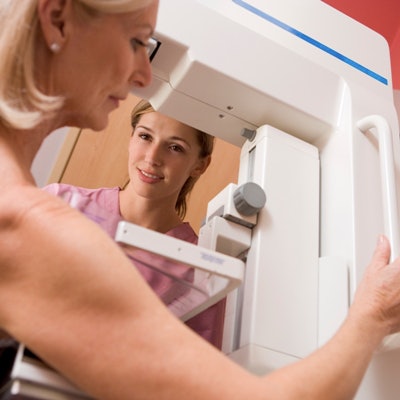
Providing women who miss breast cancer screening appointments with a fixed date and time for their new appointment could improve poor attendance and be a cost-effective way to shift national participation trends, according to a new U.K. analysis that was published on 15 May in Lancet Oncology.
A randomized controlled trial took place in six National Health Service Breast Screening Programme centers in England, involving 26,000 women who had missed their last appointment. The research team, led by Dr. Stephen Duffy, PhD, from Queen Mary University of London, found that attendance was significantly higher for those receiving a timed appointment than those receiving an open invitation. Also, the increase was higher for women with a lower socioeconomic status.
"We often feel that it is too difficult to change people's behavior, and we should just let people do what they do," he said in a release from the university. "But this study seems to indicate that fairly simple changes do substantially change behavior, and can increase the rate of participation of screening."
Drop in screening
In England, participation in breast cancer screening has been falling in the past 10 years, getting close to the national minimum standard of 70%, with screening particularly low in areas of socioeconomic deprivation, explained Duffy and colleagues (Lancet Oncol, 15 May 2017).
The screening program invites women between the ages of 50 to 70 to mammographic screening every three years. The usual practice for those who don't attend their first offered appointment is to issue them a second invitation letter. Some centers supply "open" invitations, asking them to telephone to make an appointment, while others send an invitation with a fixed date and time, requiring no effort from the invitee to book an appointment.
The authors sought to determine whether fixing a new appointment made a difference in terms of attendance -- and found that it did.
Attendance within 90 days of the first offered appointment was significantly higher for those receiving a timed appointment (22.3%) than for those receiving an open invitation (12.3%), and the increase was higher for women with a lower socioeconomic status.
Offering a second timed appointment caused an absolute increase in attendance of 10.4%. The greatest absolute increase in attendance was seen in southeast London (13.8%), followed by Sheffield (11.5%), Derby (11%), west London (9.6%), Plymouth (8.2%), and Hull (7.4%), according to the researchers.
Fixed appointments also had a substantial benefit for women who hadn't attended a screening appointment in the past six years, and a small benefit for women who hadn't attended for nine years.
Offering timed appointments could also be cost-effective if applied when overbooking appointment slots, they added.
"Clinics currently overbook appointments to take account of the fact that those invited don't all turn up, but these decisions sometimes have to be made on incomplete information," Duffy said in the release. "This study helps estimate how likely it is a previous nonattender would show up to their second timed appointment, and could be used to aid decisions on how much to overbook on those time slots."
Although the six sites were spread across England, a limitation of the study is that the centers might not be representative of the English population overall, the researchers stated.



















